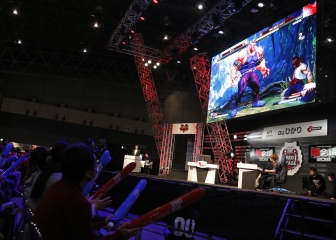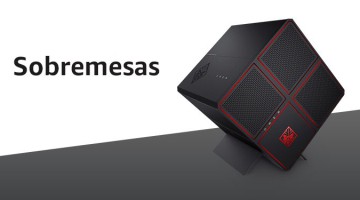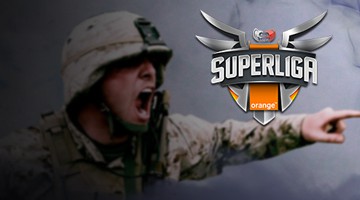Carlos Rodriguez Santiago is one of the most representative figures of esports at both Spanish and international level. He became known worldwide thanks to League of Legends, the game in which he competed at the highest level for several years under the nickname of "Ocelote". He retired to create one of the most important clubs of the industry: G2 Esports. Now, being father and a businessman, he has a lifestyle very different from a professional player.
Juan: This year has been crucial for G2, What is your assessment regarding the first season in the LCS?
Carlos: The fact that we came from the second division and won it all in Europe are good news, indicates that we do something well. But don’t believe that we are super happy either, I mean, the reason that we arrived to the first division and that we won everything there is because we are quite ambitious in the sense that if something goes well we don't get cocky. We are well recognized, but it is not enough, we want more. We want to win a World Championship, we want to win international tournaments, we want to maintain the consistency, we want to continue creating good content, etc. It doesn’t end here.
It is not enough, we want more. We want to win a World Championship.
Juan: What is your perspective on the League of Legends World Championship?
Carlos: We had very high expectations. We arrived quite confident in the sense that the scrims went very well. We recognized ourselves as a top team and our goal really was to reach the finals. Obviously it didn’t end up like that.
We didn’t get out of groups due to several factors, for example, we have players that are 17 years old, well imagine, being 17 years old you arrive to a World Championship with a lot of people looking forward to see you play, with a lot of pressure, you hand starts shaking, it’s normal.
But in any sport there is always a tomorrow and the tomorrow is the LCS and we have to win it again twice again and then go to Worlds to do it well.
With 17 years you arrive to a World Championship with a lot of pressure... your hand starts trembling.
Juan: At the end it came to two Korean teams fighting in the finals. Since the third season they are dominating, what do you think is the difference between Korea and the West in esports?, is it that complicated to compete against them?
Carlos: I believe that in the end everything is just culture. They have a quite structured culture. There really is a lot of money at stake now in South Korea in esports. Money creates a virtuous circle, allows you to create more complex structures. It lets you somehow put the players in a dynamic 1% better and, ultimately, the difference in a game is a 1 per cent and in this 1% is where the Koreans are better.
Apart from that, I believe that America and Europe are giving a lot in the sense of infrastructure, possibilities, opportunities, money. And because of that an improvement will be seen and there will be increasingly less difference between regions.
Juan: Would you change something in this young industry?
Carlos: It is growing in a natural way. I believe that we need a little more facts, more numbers to somehow go hand to hand with the hype. Normally the majority of the people who have money, that is where you really create opportunities, the billionaires, are interested in numbers. Also in the emotion that entails having an esports team, but mostly in numbers. The Real Madrid is interested in the number of fans that you have, the number of impacts that your brand can achieve.
But besides that, I believe that the industry is to growing naturally and I wouldn’t change anything really. Another thing is to have a more open mind to recruit talent, talent is the most important thing in each company and in esports is no different.
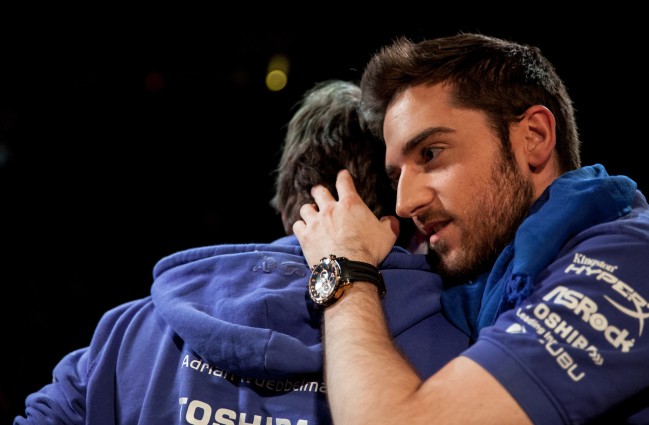
Carlos “Ocelote” Rodríguez hugging a teammate after a match Houarnev Louaisel
Juan: Regarding the gurus, what is your opinion on this type of personality in esports?
Carlos: After all, esports is no different to any other industry. There are always people who sell themselves well that have no idea and there are be people who do not sell well themselves and that know a lot.
All companies within the esports scene grow with the wave because it’s a sector which is in constant growth and that has not even been reached a tenth of its potential. This does not mean that these companies have a lot of talent or that know how to make very good things, it means that are simply part of the wave and the wave rises, the wave grows. The problem will come when the wave stops growing at this speed, I do not know how long it will take until that happens but at the moment the wave grows very quickly and the talent within esports is quite limited.
When the talent of industries such as football, NBA, industries even technological: Apple, Google, etc. As this talent appears in esports and understands how to make esports a top entertainment, then we will see a filter. It is going to be a filter so that the management of the esports companies will only afford to have people with talent to survive. If not, they are going to be eaten.
It is a sector which is in constant growth and that has not even been a tenth of its potential.
Juan: Is there something that you would change within the competitive scene as the owner of an organization?
Carlos: Yes, the first thing is that it is necessary that other videogame appears. Nowadays there are Counter Strike, League of legends and Hearthstone as the most important. Then there is Dota and perhaps Overwatch as secondary... It is clear that the more tier 1 games the better for the teams, since they depend less on the publishers, i.e. Riot Games, Blizzard, Valve… Always as an organization you want to depend less on the developers, because they have too much power and it creates an illogical balance of power.
Juan: How is it going with the Counter Strike team? There are times in which you have great success and then suddenly not, is it the very nature of Counter?
Carlos: Counter Strike is a game that has been alive for a long time and there are a lot of teams that are very good. It is really the esport that depends the most on the momentum of the team. If the team comes with energy, with a super good dynamic, it is very possible that they do well in the event. If the team comes a bit down... They have 12 tournaments per year and some are not going to end up playing at 100%, it’s normal. For this reason there are events where we destroy and there are events where we lose in the quarterfinals, is completely logical. You can see it, SK Gaming, one of the best teams in the world right now, wins wins wins and suddenly loses loses loses. It is impossible that with so many events all the teams are at 100% always.
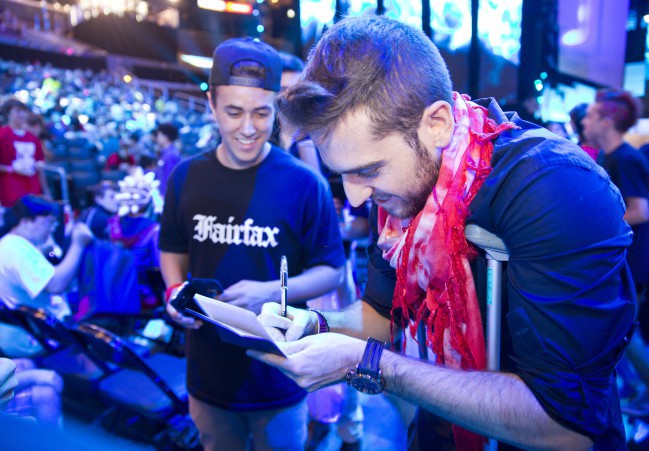
Ocelote signing autographs in the World League of Legends of 2013. Riot Games
Juan: Throughout your career, either as a player or as the owner of the club, what has been the most memorable moments?
Carlos: There have been many. I believe that, as owner, when we won the LCS. That and when we sold the team of CS:GO for nearly a million and got a better one for free. That was truly a shot of adrenaline.
As a player I also had very nice moments as when I qualified for the first time for the first League of Legends Worlds or for the World of Warcraft World Championship. All those moments are linked to victory or to success in some way.
I'm having more fun as an owner than as a player.
But not I am guided by this success, I am guided by the day-to-day success. The success of getting up very early and do things, create things. Having calls of two, three hours to debate a small detail of a video and then see that the people appreciate it. Such things are what really draw me. Those are small things, but if each day you make a pair of them it gives you a purpose to what you do.
And at the end, a founder of a company always wants to create. That is what he likes, is what he wants to do. Wants to create impacts, wants to create value. Wants to create jobs, wants to create everything.
Juan: What can we expect from Ocelote in the future?
Carlos: For the time being I have learned that having a wide focus is bad. I was going to say that I have the energy to be an owner of six companies [laughs], but… although it is true that I believe that I have, the reality is that you cannot make a company legendary, a legacy, when you have different things in front of it.
I want G2 to be the Real Madrid of esports.
I wake up, I think in G2, I lie down, I think in G2. I get up at 4 in the morning with sweat, I think in G2. I shower, I think in G2, I read a book, I think in G2 [laughs]. You cannot create a legendary company without having the focus in that company. If I have two companies I would not think in G2 all the time and would not make it legendary that is what I want. I want G2 to be the Real Madrid of esports.








